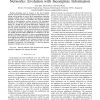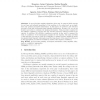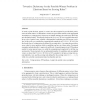11 search results - page 2 / 3 » Incompleteness and Incomparability in Preference Aggregation |
WCNC
2010
IEEE
13 years 8 months ago
2010
IEEE
—Enabling users to connect to the best available network, dynamic network selection scheme is important for satisfying various quality of service (QoS) requirements, achieving se...
JUCS
2010
13 years 3 months ago
2010
: In group decision making situations, there may be cases in which experts do not have an in-depth knowledge of the problem to be solved and, as a result, they may present incomple...
SDM
2007
SIAM
13 years 6 months ago
2007
SIAM
The problem of combining the ranked preferences of many experts is an old and surprisingly deep problem that has gained renewed importance in many machine learning, data mining, a...
CDC
2010
IEEE
12 years 11 months ago
2010
IEEE
We study a model of observational learning in social networks in the presence of uncertainty about agents' type distributions. Each individual receives a private noisy signal ...
JCSS
2010
13 years 3 months ago
2010
To make a joint decision, agents (or voters) are often required to provide their preferences as linear orders. To determine a winner, the given linear orders can be aggregated acc...



